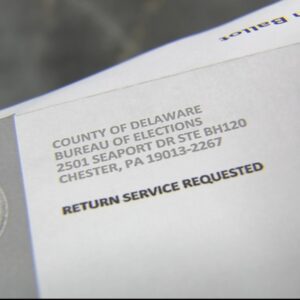The standoff continues between Delaware County Council candidate Joy Schwartz and county election officials over viewing and counting the envelopes that mail-in ballots came in for the May 16 primary.
Schwartz and plaintiffs Gregory Stenstrom, Leah Hoopes, and Paul Rumley have filed three petitions asking the Commonwealth Court to intervene. Schwartz and her supporters were initially denied permission to look at the envelopes by county officials. Then, after the certification occurred Thursday, they were told they could. However, Acting Secretary of State Al Schmidt said the names must be redacted from those envelopes first for privacy reasons.
As workers began to affix blue strips of painter’s tape over the names, Schwartz was concerned there would be damage to the envelopes and filed a second court challenge.
However, Schwartz had wanted to see the envelopes before certification, fearing any challenges would be moot once the primary election was certified.
The county Board of Elections voted 2-1 to certify the election on Thursday, with minority Republican member John McBlain voting no.
Schwartz asserted her right to see the materials, saying both McBlain and county GOP Chair Frank Agovino supported her.
“I do not understand the recalcitrance of the county in granting me this request,” she said.
Election Board Chair Ashley Lunkenheimer scolded Schwartz.
“It’s interesting. I don’t know if it’s ironic, as a line in an Alanis Morrisette song. We’ve had so many debates over the chain of custody, and you and others are coming forward to say… ‘Somebody touched the ballots,’ things we’ve found not to be true. And here it is, and you’ve asked to go sorting through some of the materials in an uncertified election… It’s just interesting to me that you, of all people, would be asking to touch some of the election materials.”
McBlain said it was a request to examine the outside envelopes, not the actual ballots. “It seems to me that some of our officials are making decisions based on who the requester is.” He read the regulations saying the materials should “open for public inspection during normal business hours.”
“It is important to allow the public to view the records,” said McBlain. “There’s no good reason why Ms. Schwartz or anyone else can’t see the (envelopes). This board and employees are in the wrong.”
Lunkenheimer said, “Integrity is how we operate.”
Voting services director Jim Allen said, “Act 77 (the mail-in ballots law) is being misquoted.”
In her most recent filing, Schwartz asked the court to “order defendants to immediately comply with the Pennsylvania Open Records Act of 2008, the Election Reform Act of 2019 (revised in 2020) referred to as Act 77, to include the signatures of electors on the expended (opened), absentee MIB envelopes from the May 2023 primary election, and to cease from allowing Plaintiffs to exert their civil rights in violation of USC 42 § 1983.”
Further, Schwartz and other plaintiffs said, “Defendants remain recalcitrant to provide meaningful access to public records, specifically the expended (opened) MIB envelopes for inspection.
“Plaintiffs hold no immediate interest in the ballots, or images of the ballots, or the CVR records with images of the ballots, at this time, and point out that the ‘Risk Limiting Audits’ offered by public officials since 2020 as ‘evidence’ of honest elections only test the efficacy and accuracy of the scanners that record the marks on those ballots, and have little use, or practically nothing to do with gauging the ‘honesty’ of elections.
“Plaintiffs’ interest and subject of controversy before the Honorable Court is (are) the forensic origins and legitimacy of cast absentee ballots, for which only the absentee MIB envelopes and signatures of electors remain as critical and germane evidence of election integrity to ascertain if the votes which were cast by absentee MIB voters were those of verified ‘qualified electors,’ and that the signatures on the MIB envelopes were genuine,” the filing said.
Asked to respond, county spokeswoman Adrienne Marofsky said, “The plaintiffs are seeking records that the Department of State instructed Delaware County to redact so that voters’ personal information was not visible.
“The county began to redact the information – until the plaintiffs said they did not want to view redacted records. There is no validity to the claim that any records were damaged. It will now be up to the court whether to affirm the instructions provided to the county by the Department of State.”
Please follow DVJournal on social media: Twitter@DVJournal or Facebook.com/DelawareValleyJournal

